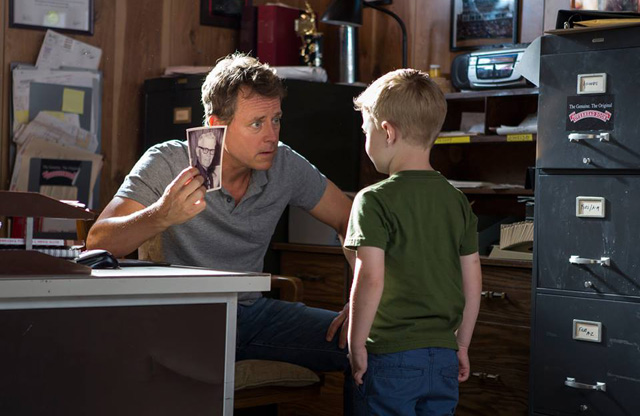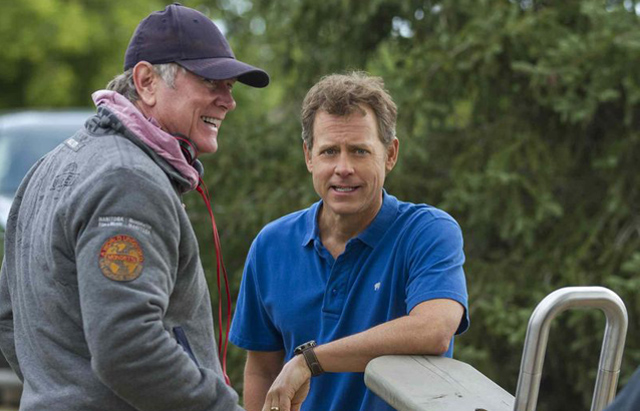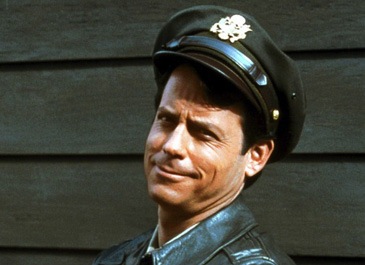CHICAGO – Excelsior! Comic book legend Stan Lee’s famous exclamation puts a fine point on the third and final play of Mark Pracht’s FOUR COLOR TRILOGY, “The House of Ideas,” presented by and staged at City Lit Theater in Chicago’s Edgewater neighborhood. For tickets/details, click HOUSE OF IDEAS.
Interview: Greg Kinnear is Preaching in ‘Heaven Is for Real’
CHICAGO – The actor Greg Kinnear has been known for his neat and tidy image, but never has he portrayed a religious leader. His role as Todd Burpo – a pastor of a church and the father whose son believes “Heaven Is for Real” – brings the energy of spirituality to the movies just in time for the Easter holiday.
Born in small town Logansport, Indiana, Greg Kinnear was the son of a career diplomat, and moved around quite a bit as a child, even living overseas. He is a veteran actor who first came into prominence when he hosted the first version of “Talk Soup” on the E! Network in 1991. Four years later, he made a splashy film debut as David Larrabee in the 1995 remake of Billy Wilder’s “Sabrina,” directed by Sydney Pollack.

Greg Kinnear Portrays a Skeptical Pastor in ‘Heaven Is for Real’
Photo credit: TriStar Pictures
A couple years later, he was nominated for the Best Supporting Actor Oscar for his 1997 role in “As Good As it Gets.” Through his career, he has taken a variety of different character parts, including portraying the double life of sitcom star Bob Crane in “Auto Focus” (2002), but he is also done a number of “nice guy” roles in “A Smile Like Yours,” “Dear God” and “Someone Like You.” His latest film, “Heaven Is for Real,” marks his second collaboration with director Randall Wallace, after 2002’s “We Were Soldiers.”
Greg Kinnear sat for an interview with HollywoodChicago.com during a promotional tour for “Heaven Is for Real.” The actor had lively and varied perspectives on the spirituality of the film, and his storied career.
HollywoodChicago.com: Portraying a spiritual man is a difficult and delicate balance. What nuance did you want to bring to the character of Todd Burpo as a preacher, and what did you pick up from the man himself?
Greg Kinnear: What I hoped it wouldn’t be is that the character would feel like a preacher. Every film I’ve seen, in dealing with a ‘man of the cloth,’ has that reverence and the sense of ‘when you’re a preacher you’re preacher.’ Todd isn’t like that in the film. He’s a volunteer firefighter, he’s a wrestling coach, a garage door installer, a husband and a parent. In this composite, he is a richer guy, more than just a pastor. The idea that someone wears more than one hat in life felt more truthful to me, because I originally came from a small town.
So he’s a lot of things, and a pastor who had quite an experience with the story his son brought to him. My interaction with Todd was very modern day – we Skyped each other. [laughs] He was very forthcoming when I asked questions, but I intentionally didn’t read the book.
HollywoodChicago.com: How did you get involved with the project?
Kinnear: Randy Wallace, the director I had worked with on ‘We Were Soldiers,’ pitched it to me as his latest project, and I thought it would make an interesting movie if it was told properly. And that was my introduction.
HollywoodChicago.com: Speaking of Randy Wallace, he composed a ‘heaven on earth’ scenario in the way he created the atmosphere of Todd and Sonja’s existence, which the characters interestingly enough kind of ignore. When you came onto this film, did Wallace communicate what he wanted to do with the film and you immediately, or did it evolve as the production went into actual filming?
Kinnear: It did evolve after I began my involvement. For example, we didn’t have the kid yet, there were still the auditions going on for that. Plus Kelly [Reilly, who portrayed Todd’s wife] hadn’t been hired yet, so we hadn’t had an opportunity to figure out that relationship. The beauty of the film comes from cinematographer Dean Semler, who also shot ‘We Were Soldiers.’ Randy was adamant that Dean capture that ‘beauty is all around us’ for the film. There is a certain analogy that there is a ‘heaven on earth’ for the family and reality, if you could see through the conflict.
That was the interesting point about the film, it had more conflict than I thought it would. The title is ‘Heaven Is for Real,’ which is not very ambiguous. [laughs] so the fact that the boy – who had a near death experience – would come to his father, who is a pastor, and say what he saw was consistent to what he preaches, you would think that would end in a high-five, a hallelujah and that would be the end of it.
HollywoodChicago.com: And yet the film chose a different path.
Kinnear: Yes, instead it begins a journey of self reflection for Todd. He’s being asked to examine his beliefs much deeper than he ever anticipated. The town itself is not responding positively to this notion, and the church congregation certainly isn’t, and the way the media was handling it added to the conflict. There was much more of that in the story than I first expected.

Director Randall Wallace Confers with Greg Kinnear On Set in ‘Heaven Is for Real’
Photo credit: TriStar Pictures
HollywoodChicago.com: The film does reach out to the child himself, and his visions, but it plays to a larger theme that is universal and not necessarily religious. What is your feeling about the spirituality of the story vs. the religion?
Kinnear: It’s hard for me to discern where the spirituality comes out. I’ve asked friends and family who have seen the movie for their opinion. There is a movie here that is a respectful tip of the hat to the book, with its strong religious themes. At the same time, I think the film manages to avoid the trap of getting overly bogged down in the issues of what-did-heaven-feel-like and what-did-it-look-like. Instead, it keeps the story focused on the events as told by the Burpo family, and allows a viewer – regardless of their where they fall on the spiritual palette – to watch these events unfold from a front row seat, and see what it might have felt like for them.
It’s not saying you need to believe this to watch the film or be entertained by it, but it is saying that these are the events as told by this family, and Randy’s work is excellent in that instance. It feels very authentic to me that this is how it probably happened.
HollywoodChicago.com: The book did cause some backlash regarding how specific the visions of Colton were, and how they seemed to line up precisely with Christian doctrine. Do you think a similar film about another religions’ ‘vision of heaven’ would sit right with Christians? Is it fair to criticize the doctrine of the visions in this film?
Kinnear: It’s hard for me to get too deep into the conversation, because I’m not familiar with the book. Randy requested that I don’t read it, he wanted me to look at the story we were telling in the screenplay. Clearly, it’s a reflection of the book, and the Burpos themselves are pleased with the film’s outcome. I don’t think that we crossed any lines, but for me to get bogged down into the dogma of it all – not only would it make the story much less interesting to me, but I wouldn’t know how to tell it.
If I were to get on the trail of believing something or not believing something, I don’t think I would know what to do with those concepts as an actor. Whereas in the screenplay that was presented to me, if it was told honestly, that was a good journey. That would be an entertaining movie to make, and people can take away from it what they want.
HollywoodChicago.com: Not to drop any names, but Richard Dreyfuss once told me that when he was involved in the remake of ‘A Guy Named Joe’ – which became the film ‘Always’ – that the cast had a hard time because he thought they kept thinking of the original movie. Did the cast of ‘Sabrina’ have a similar problem in remaking that Billy Wilder classic? Did director Sydney Pollack have to do anything to relax the cast?
Kinnear: Well look, it was the first film I ever had done, and I was just waiting for someone involved in the movie to come up and tell me I didn’t belong there, that I wasn’t an actor, and would I please remove myself from the set. [laughs] I wasn’t dwelling too heavily on your question. Whether Sydney or Harrison [Ford] were having that discussion, I have no idea. I was just trying to get through the job, because it was my first movie.
However, it did weigh heavily on Sydney. He did show it to Billy Wilder, who was still alive at the time of the film’s release. After the screening was over, Wilder didn’t say anything. Finally Sydney asked Billy, ‘what did you think?’ Billy replied, ‘You’ll see, someday they’ll remake [Pollack’s film] ‘The Way We Were.’
HollywoodChicago.com: You’re understanding of Bob Crane in ‘Auto Focus’ was somewhat of a miracle. What elements of your soul began percolating when you knew you had to create that part of Crane that had a sleaze factor, and do you in effect think we’re all like Bob Crane, seemingly harmless on the surface but bubbling in secrets underneath?
 Greg Kinnear as Bob Crane in ‘Auto Focus’ Photo credit: Columbia TriStar Home Entertainment |
Kinnear: Well, not to the extent that Bob was. I sparked instantly to that script, and [director] Paul Schrader was the right guy to tell that story. Bob was a slightly different person, but I do think there is a dichotomy in people, and there is more than one current running through most people. Whether it’s struggle or not a struggle, or a calculation and manipulation in controlling those behaviors, however it manifests itself, the human being is inherently complex.
HollywoodChicago.com: You were involved in another controversy recently when you portrayed JFK in the miniseries ‘The Kennedys.’ Why do you think culture still wants to go back and re-interpret the era of the Kennedy ‘Camelot’ – besides the perceived innocence? And what did you understand about Jack Kennedy that you never saw in the recent 50th anniversary of his assassination, for instance?
Kinnear: Everything I saw last November seemed to get it right, because there is no shortage of conversation regarding John F. Kennedy. The controversy you mentioned didn’t reflect on the set, the making of the miniseries was decidedly non-controversial. The cast and production was stellar. The ‘controversy’ was simply that ABC-TV, who owns the History Channel, didn’t want to air it there, due to some internal in-fighting at the executive level.
I enjoyed portraying JFK, and the discovery of it, and the examination of the man is interesting. This examination of him will be ongoing, I believe, for many generations to come.
HollywoodChicago.com: Given your background as a self described ‘Foreign Service Brat,’ what part of being in the spotlight in your later life seemed to run completely opposite to that early background, and how do you think your relative stability interacts with that childhood?
Kinnear: There are a lot of actors I know who had lives where they moved around a lot, and it seems to be a connection to that life in the desire to be an actor. I worked with Julianne Moore recently, who gave me a book about TCK, Third Culture Kids. The author did a study on kids that lived overseas, and how they tend when older to find work that allows them to change identities. The notion is that in moving around, you’re never comfortable in your own skin. My relative stability today is through my family, I’m blessed with a great family and I’m very lucky to have that.
 | By PATRICK McDONALD |



Nice chat
Do you think he’s as down-to-earth, sincere as he seems in his answers? Did you ask if he ever goes back to Indiana?
He moved all over the place
He moved all over the place as a child apparently, but lists Logansport as a hometown. It didn’t come up. But I will say he’s very thought-provoking in how he approached the answers. It’s given that he approaches his craft with study and appreciation.